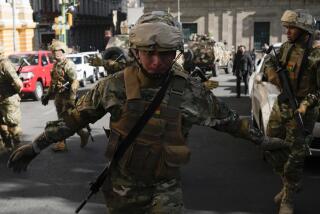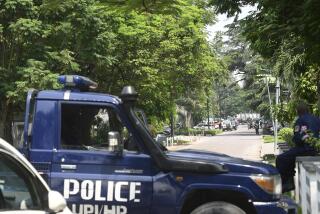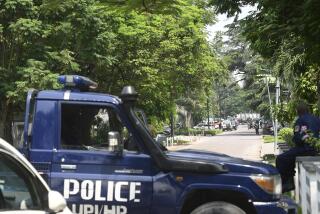Burundian Leader Seeks U.S. Protection
- Share via
BUJUMBURA, Burundi — Hours after he was attacked by stone-throwing mourners at a funeral for victims of a massacre, Burundi’s president took refuge at the U.S. ambassador’s residence here and urged his compatriots Wednesday to resist attempts by others to seize power in this country riven by civil war and ethnic bloodshed.
Even before Sylvestre Ntibantunganya’s surprise Tuesday night move was confirmed late Wednesday, the chief opposition political party announced that it was pulling out of his coalition government, apparently leaving this bloodied Central African nation with neither a president nor a legitimate government.
Western diplomats said they feared the sudden, dramatic power vacuum after four days of sharply rising tension might spark a military coup or new atrocities between ethnic Hutus and minority Tutsis.
Massacres by the groups in neighboring Rwanda two years ago left as many as 800,000 people dead, most of them Tutsis.
In Burundi, the Hutu-Tutsi conflict has killed an estimated 150,000 people in the last three years.
But on Wednesday in Bujumbura, Burundi’s capital, the streets were calm. There were no unusual military movements reported--though it was unclear whether a coup was underway, and there were reports of heavy ethnic fighting in southern Burundi.
Some military leaders denied that they were trying to seize power.
“I can’t see any sign of a coup,” said Lt. Col. Nicodemus Nduhirubusa, a military leader and advisor to the Tutsi prime minister.
The president and his wife drove with their own escort to U.S. Ambassador Morris “Rusty” Hughes’ official residence about 8:30 p.m. Tuesday and spent the night and all day Wednesday inside the spacious compound, said Judith Mudd Kaula, an embassy spokeswoman.
“He is under the hospitality of U.S. Ambassador Hughes,” she said.
Neither the ambassador nor the president met with reporters.
Officials said the president had asked the U.S. government for refuge, not political asylum.
There were conflicting reports that he would be flown overnight to neighboring Tanzania or another African country.
U.S. officials, meanwhile, warned the military that the Clinton administration will not tolerate a coup.
In Washington, State Department spokesman Nicholas Burns said the United States will “work to isolate any government that emerged in Bujumbura by extra-constitutional means.”
Burns said the administration delivered a pointed message to all Burundian factions Wednesday “about the very strong belief of the United States that constitutional procedures should be followed.”
He said the United States would offer airlift and other logistical support if the United Nations--which called for calm and international support for the legitimate government of Burundi on Wednesday--sends a peacekeeping force. But he said Washington will not send ground troops.
Burns said there are 80 American citizens in Bujumbura: 19 embassy employees and 61 who work for private missionary and relief groups.
“We have checked with all these people. They are safe, and we’re not aware of . . . any kind of threat to Americans,” he said.
Burns said former Rep. Howard Wolpe, a Massachusetts Democrat serving as special envoy for Burundi and Rwanda, will return to the region this week “for another round of diplomacy.”
Ntibantunganya, a Hutu, reportedly telephoned the U.S. ambassador Tuesday shortly after being forced to flee in a helicopter from an angry mob of rock- and cow-dung-throwing mourners at a Bujumbura funeral for 320 people, mostly women and children, who were massacred Saturday at a camp for displaced Tutsis near the town of Bugendana, 45 miles northeast of the capital.
The Tutsi-led army has blamed extremist Hutu militias for the slaughter.
The president--a onetime journalist whose wife was killed by Tutsi soldiers three years ago and who has seen his two predecessors go to violent deaths--was shaken but uninjured in the melee and flew back to the capital.
He apparently panicked two hours later after hearing unconfirmed reports that paratroopers had seized the government-run television and radio station and that a military coup was underway.
Broadcasts were normal Wednesday, however.
“Maybe it was precipitous on his part,” a diplomat said, adding: “Obviously he fears for his safety.”
Mames Bansubibko, a close Ntibantunganya advisor, said that “the president feared for his life and his own security forces were not responding to his requests. He is staying with the U.S. ambassador to make sure he is not going to be killed.”
In a telephone call to Burundi Radio, the president called on Burundians not to support any attempts to overthrow the legitimate government of the country.
“Ignore politicians who aim to plunge our country into chaos by seeking to overthrow our current leadership institutions,” he said.
In a recorded message released to the British Broadcasting Corp., he said it did not matter that he was not in the presidential palace. What was important, he said, was that he was still in the country. “A person making decisions had to do it in a quiet, secure place,” the president said.
Diplomats and aid workers said the week’s events almost certainly torpedoed the hopes for peace raised earlier this month when six African leaders, supported by Washington, offered to send African peacekeeping troops into Burundi to prevent the conflict here from escalating and further destabilizing the region.
Critics had warned that outside forces would undermine the Tutsi-led army and ruling class and expose Tutsis to the kind of genocide that occurred in neighboring Rwanda.
The war here is more of a slow-motion blood bath. The 150,000 Burundians who have been killed, mostly civilians, were slain by Hutu militias and the Tutsi-dominated army after Tutsi paratroopers assassinated the country’s first democratically elected Hutu president in 1993.
The conflict has led to an African form of “ethnic cleansing,” with Tutsis gathering in the cities and towns while Hutus have been forced into the countryside. An estimated 200,000 people have been displaced.
The fighting and the fear have intensified since April, when Hutu militias launched surprise attacks against Tutsi strongholds.
About 85% of Burundi’s 6 million people are ethnic Hutus. But the minority Tutsis control the army and most of the economy. An ethnically mixed coalition government was formed in 1994 with U.N. assistance. That attempt at power-sharing appeared to collapse Wednesday when the Tutsi-led Uprona Party, which held about 40% of the seats in government, pulled out of the coalition in a clear rejection of moderation.
Charles Mukasi, Uprona Party president, denounced the Hutu president for what he called “crimes and acts of high treason,” including his support for international intervention.
Burundi was a monarchy for centuries before it came under the control of Germany and later Belgium. Many Burundians argue that these outside forces, rather than traditional tribal enmities, created the ethnic divisions that have repeatedly exploded in bloodshed since independence in 1962.
Times staff writer Norman Kempster in Washington contributed to this report.
(BEGIN TEXT OF INFOBOX / INFOGRAPHIC)
A Divided Nation
Some facts about Burundi:
GEOGRAPHY--Landlocked in Central Africa with total area of 10,750 square miles.
PEOPLE--About 6 million, including 85% Hutu, 14% Tutsi, 1% Twa. Official languages, Kirundi and French. Roman Catholic 62%, traditional beliefs 32%, Protestant 5%, Muslim 1%. Literacy about 50%.
ECONOMY--Resource-poor, mainly agricultural. Coffee accounts for about 90% of export earnings.
POLITICS--Minority Tutsis, who have traditionally controlled Burundi, have been reluctant to share power with Hutus. Attempts by Hutus to gain greater access to power have been met by political and military repression, which has created a backlash.
In 1972, 10 years after Burundi’s independence from Belgium, Tutsi soldiers killed more than 100,000 Hutus in a massacre largely ignored by the rest of the world. Attacks and counterattacks continued to exact a high death toll through 1993.
In mid-1994, Burundian Tutsis saw the massacre of as many as 800,000 people, most of them Tutsis, in neighboring Rwanda. Tutsis drove Hutus from Burundi’s towns in a desperate attempt to create Tutsi havens. Hutu rebels retaliated against rural Tutsis.
SOURCE: Associated Press
More to Read
Sign up for Essential California
The most important California stories and recommendations in your inbox every morning.
You may occasionally receive promotional content from the Los Angeles Times.














